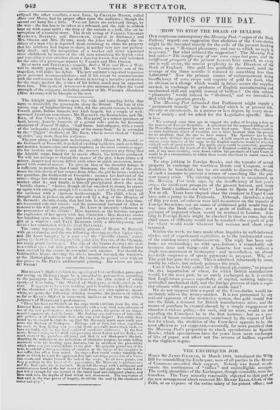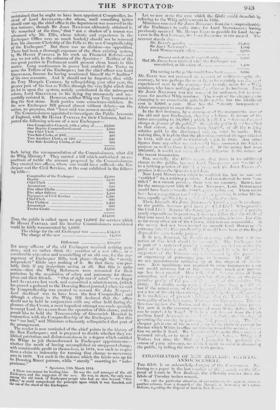THE EXCHEQUER JOB.
WHEN Sir JAMES GnAfrAm, in March 1834, introduced the Whig Bill for remodelling the Exchequer, men of all parties in the House of Commons acc6rded their support. Nobody was found toad- vocate the continuance of "tallies" and unintelligible receipts. The costly absurdities of the Exchequer, though venerable, were de- fenceless. The Tory minority reasonably objected to that part of the new arrangement. which removed Mr. HENRY Eems, Clerk of the Pells, at an expense of' the entire salary of his patent office; and maintained that he ought to have been appointed Comptroller, in- stead of Lord AUCKLAND,—for whom, until something better should cast up, the chief office in the department was reserved in the first instance, though Sir JOHN NEWPORT ultimately obtained it. We remarked at thetbnc,* that " not a shadow of a reason was advanced why Mr. Ellis, whose talents and experience in the Exchequer Office Were SO much lauded,t should not be removed from his sinecure Clerkship of the l'elIs to the DCW Comptrollership of the Exchequer." But there was no division—no opposition. There had been a thorough exposure of the then existing system, by Sir HENRY PARNELL ill his work on Financial Reform—and may we not add, in the columns of the Spectator ? Neither of the two great parties in Parliament could present clean hands in this matter. Long continuance in power had enabled the Tories to name the Tellers of the Exchequer; but the chief officer was Lord GRENVILLE, famous for having nominated himself the " Auditor" of his own accounts. And it should not be forgotten, that while the Tory Marquis CAmints, by relinquishing, year after year, the greater part of his fees as Teller, through the very light which that act let in upon the system, mainly contributed to the subsequent reform, Lord GRENVILLE to his dying day strenuously and suc- cessfully resisted it. However, neither Whig nor Tory ventured to fling the first stone. Both parties were conscience-stricken. So the new Exchequer Bill passed almost without debate—on the notion, we presume, that "least said was soonest mended." The Commissioners appointed to investigate the Public Accounts of England, with Sir HENRI PARNELL for their Chairman, had re- ported the following scheme of a new Exchequer— One Comptroller-General, with a salary of £2,000
One Deputy Comptroller-General 1,000 One Chief Clerk 800 Two Sub-Clerks, at 200/ 900 Two Auxiliary Clerks, at 1201. 240 Two Sub-Auxiliary Clerks, at 80/ 160 £4,600
Such being the recommendation of the Commissioners, what did the Whig Ministry? They carried a bill which authorized an ex- penditure of treble the amount proposed by the Commissioners. They created two offices, where one would have sufficed—the Ex- chequer and the Civil Services, at the cost exhibited in the follow- ing table—
Comptroller of the Exchequer £2,000 10 Deputy ,00 Chief Clerk Accountant 620
Five other Clerks
1,000 Five other Oilieers 1,481J
Paymaster of Civil Services 1,500
Chief Clerk 800
Two Cashiers 1,200
Accountant 600
Twelve Clerks 2,080
£14,080
Thus, the public is called upon to pay 14,0801. for services which Sir 1-Exit's: PARNELL and his brother Commissioners considered would be fairly remunerated by 4,600/.
The charge for the old Exchequer was The charge of the new l.i,neo --- Difference i:a0,409
But many officers of the old Exchequer received retiring pen- sions; and we rather think the creation of a new office, or a considerable extension and remodelling of an old one, for the ma- nagement of Exchequer Bills, took place—though the " sternly independent" Globe says nothing of it. So that there was pro- bably little if any immediate saving at all. But this is quite certain—that the Whig Reformers were rewarded for their patriotism by the acquisition of salary and patronage for them- selves and their friends. " Out of sight out of mind "—we forgot Lord AUCKLAND last week, and committed a misstatement, (which has proved a godsend to the Downing Street journal,) when We said the Comptrollership was created to reward Sir John j\-ewport: Lon' Auckland was to have been the first Comptroller; and although a clause in the Whig Bill declared that the office should not he held in conjunction with any other held during the pleasure of the Crown, a most impudent attempt was made specially to except Lord Aueitiotxn from the operation of this clause, and to permit him to hold the Treasurership of Greenwich Hospital in conjunction with the Comptrollership of the Exchequer. lint this was " too bad," and Ministers reluctantly relinquished that part of the arrangement. The render is now reminded of the chief points in the history of the New Exchequer ; and is prepared to decide whether they ex- hibited patriotism and disinterestedness in a degree which entitled the Whigs to job thenceforward in Exchequer appointments— whether the merit of having accomplished an unopposed change, with considerable profit to themselves, in 1834, was such as to give them a claim to indemnity for turning that change to mercenary uses in 1839. Yet such is the defence which the Globe sets up for its Downing Street patrons, while " sternly " asserting its " inde- pendence."
* Spectator, 15th March 1834. t There was reason for lauding him. Ile was the real manager of the old Exchequer, and the suggester of the new. Ile was, in short, the only man among the old botch of Exchequer people who had an idea beyond "this Office," or could comprehend the principle upon which it was founded, and the use of the check of the Exchequer. Let us now state the ero.:e which the Globe -otould demolish by referring to the Whig achievements in 1834. Ministers removed Sir „Tom t Nr;Wet):: e from the Comptrollership of the Exchequer to make room for Lord AIONTEACILE ; having previously removed. "Mr. IIENRY Et.m.ts to provide for Lord AUCK* TAND in the first instance; Sir Jons NEWPORT in the second. The account stands th aim
Mr. Eia,ms's pension £1,400
Sir Joux NEWPORT'S 1,000 Lord MoNTENCLEI'S •-"1"?`- 2,000 Present cost of the (.7nloptrollership 4,400 Had MT. ELLIS been retah;01 whel. the Exchequer NV:"Vz
remodelled, at his salary of.
The saving to the public would have been 3,000Mr. ELms was not removed on neeount of onfituce,s—quite the contrary, he was perhaps the litaA fit, as he certainly wits (IC leost experienced Mall in the country—bat to »male_ room for a Whig nominee, who knew nothiug about the office or its business. Eva-u Sir Jonx Nuwrone was not removed for undtlicss, but to malic:
room far another Whig nominee. The 61 the choppilig and changing is no conceivable gain to Or! but the additional
cost is 3,000/. a year. 11"ow has tho " sternly independent " Globe attempted to meet this case ? In the first instance, by a statement of the comparative cost of the old and new Exchequer, sleffie, a balance in *favour of latter amounting to 30,4097. ; celled a "detneass41 (01;001. charge in Aeon,. of Ike l the pnblie e,4! Itoe,e''4ted to that extent, as deductI uii.s ti ':n :1,1,404'7., of all the re.iring salaries paid to the die cited ofh es, must be made, Bat, waiving this, it is plain that the plea of economical changes cifected in 1834. vill not avail to \vhitewasli '1 ifth in 1839. Any other figures from any either cc r7t have nnRwered the Chil-k-.s
purpose as well es the::: if the saving had been
300,0001., it would not lot:;:e .110.11.cetice in the nature of the recent transaction.
But, see,)ndhe, the 67o!s! tleit there is no additioeot charge to the public, 'twee-use Lori :'14e, re.on.e was " er.tit4-t1 " to a retiring pension of 2.0..c4/, a ye„.., and Sir JODN 1%■1:WPC.ZI''• pension is front the Queen's Liv:1 Lsz• Now Lord :MONTE WI.E lak::11, for, but liC Mai not
"entitled" to, a retiring peosioo. • !41 even though he were " en- titled " to a vacant pensieo, there no vacancy. Hence, but
tbr the arrangement with Sir JORS AIONTEAGLE would have been wines the ono!. •• • "I here mitrimt have been competitors too r. •.• f!..• ters, equally quelitierl hy a Then, forsooth, Sir Jinx NUN, r■ to the pUblie, because p 1 Ce,c the Civil List ? Because tle•v1- yearly experaliturc ill peIs a.. It
that sum must be spent, tool ie -. F h or ('us,
as Ibr every other act of time t mini,,ters arc respoosdile. 1t. the money hod Dot bec.al ‘‘,'•1•■•1 to sM00111 Lord MoNTEAG.
entrance into th? :t -Id have been it the Royal disposal f p
action of tLis 1,i7p1 t cy that rk. It is art 01' 1. The 1S p :I, 1 WI talc; :v.
guise of 11.•!,,r;:,:' ;•, tto, z supporters .L•t' the Go\,.
or expectancy of ptllri i. (•:t. ,•• We see IllipOiDDIIClitS SIO'll0e,.; nil at the . tors. New 11 mac! was require,' in some instmice, I L cy out useful reforms: but at the tiyle much new Pa, age has has been ereoted. Men tItC 0 wv cpnrrrativc npt.r:ty • '!::.••a!--.•!'
ouptio. mt141 f e
u•,t to
but if the aettr:i ',tote of ,• •t
IliStry. il(11.114, :i'.■
in other Mitiis-
veot. i oo charge Who provides '44,1 a certain .';c whJle of not a few of tle, ,01,1 \ ic s lie!
It is no defoice vf ite..•.; weN ptilty
tioti the 1.1,s, ilo Yet 110W it is the common 4. Ne I 1 tee can be man:tool by Tory! 'I.• :- position Lord A !,I1: ;1 governing: the It II 1 . CheqUel Job i one of die fluence which IV lie's ii office -• fore we strike it hard. NVe !, - personal attack, or to hoe! Tories ; but since the "■1:o course of party advocacy. ne I the public, by telling the trete4 '1" 11,..101 the !
• :-!•._ 1.1 di. tilIlU “1. L01.1.1114 ;i1.
■ n,loitl the n:e.":4■1'
• 111:1:0 <
1 1:::',111 e.o.",st in
tenttie,:.



























 Previous page
Previous page